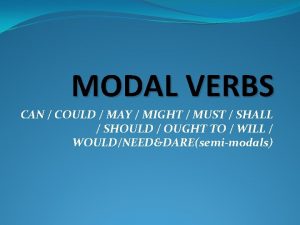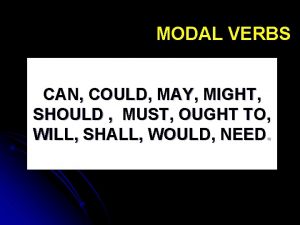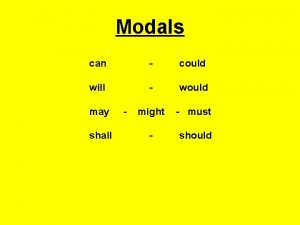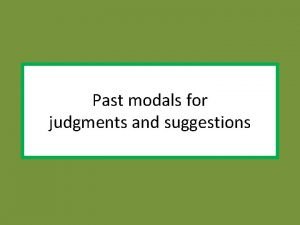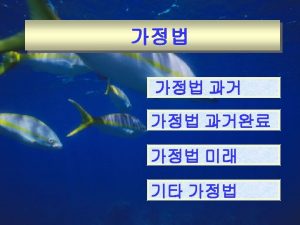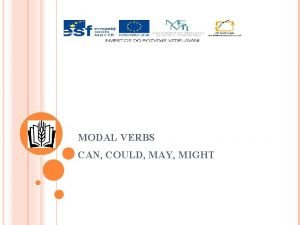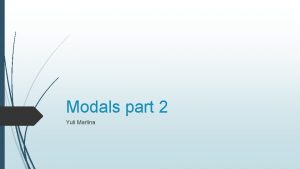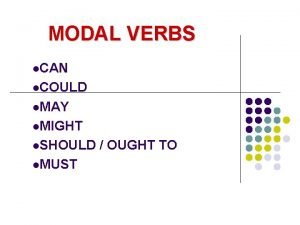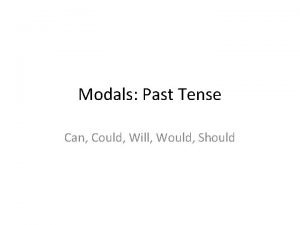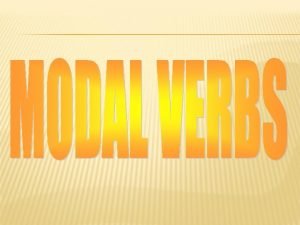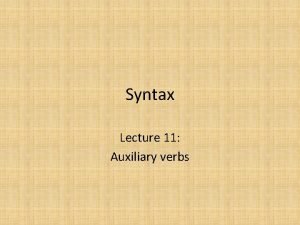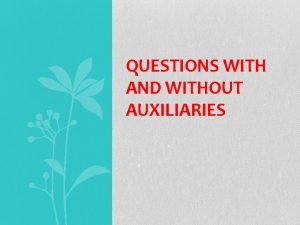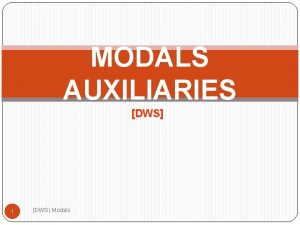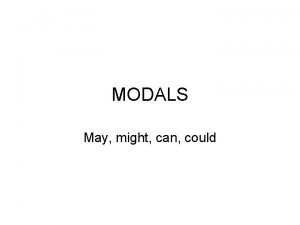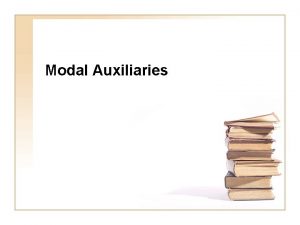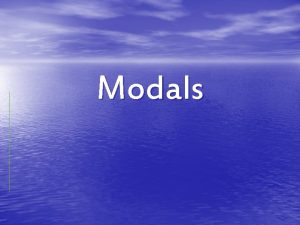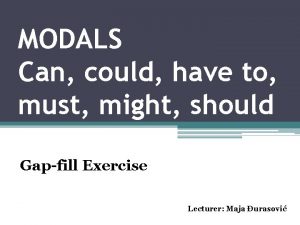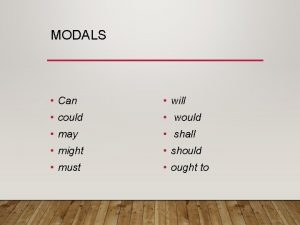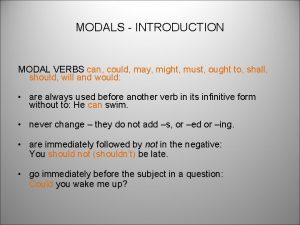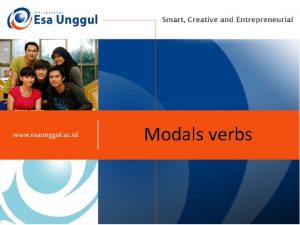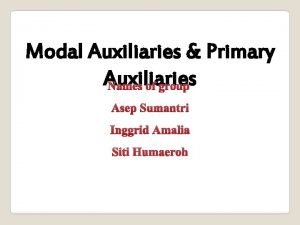MODALS CAN COULD MAY MIGHT Should These auxiliaries














- Slides: 14

MODALS

CAN COULD MAY MIGHT Should

• These auxiliaries, are used with the sample form of the principal verb. The same form is used for all persons. • E. G: He can swim well • We can ask him if he’d like to join us • I can’t ski. I do not know how to.

• CAN(present) expresses ability, mental or physical. It expresses the idea of know how to do something, be able physically to do it, or the idea that the circumstances will permit an action. The negative form of CAN is CANNOT or the contraction CAN’T. • E. g. : Can he swim well? He cannot dance very well. That’s why he prefers to sit at a corner and drink something whenever he goes to a club.

Use Could to say something is possible or likely in the future • That table could be good for my office. • Your work on this could be useful later on. • A: What shall we buy Martha for her birthday? B: Well, we could buy her a sweater or we could buy her a nice necklace.

• COULD is the past tense and the conditional tense of CAN. The negative form is could not or the contraction couldn’t. • E. g. : He could not wait for us. I could go if I had the money.

CAN & COULD • • A)____we finish the book this year? B)No one ______translate that sentence. C)He said(that) he______wait for us. D)I____come to the last class since I have an appointment with my dentist in the afternoon. • E)She______be there by noon. • F)_____you tell me where she is? • The price of petrol ___ go up soon.

CAN, COULD • • A)_Can___we finish the book this year? B)No one _can_____translate that sentence. C)He said(that) he__couldn’t____wait for us. D)I__cannot______come to the last class since I have an appointment with my dentist in the afternoon. • E) she_could_____be there by noon. • F)__Can___you tell me where she is? • The price of petrol _could__ go up soon.

MAY - Permission-Possibility • MAY(present) expresses either permission or possibility. There is usually no contraction in the negative. • Permission- May I borrow your book? Of course you may borrow it • Possibility – I may see her tomorrow.

. In these tenses MAY it expresses either permission or possibility. MIGHT is also used to express slight possibility in the future. • Permission- Her mother said(that) she might go. • Possibility- I said(that) I might see her tomorrow, but I am not sure.

Should-Shouldn’t • Use should-shouldn’t to say if something is advisable or not. • He has a severe headache. I think he should take an asprin. • Mary cannot sleep at nights. She shouldn’t drink too much cofee. • We probably shouldn’t wait any longer to start writing the essay.

HAVE TO • In traffic all the drivers have to wear a seat belt. • Everybody has to be quiet in the public library. • The people who are travelling by plane have to turn their mobile phones off.

MUST Mother: What are you doing here? Jack: I am chatting with my friends on the msn. Mother: You must do your homework first. You don’t study enough. You will fail. • Your project must be on my desk by the end of the day.

Mustn’t vs. Don’t have to • Use mustn’t to say it is necessary or important NOT to do something!!! • They mustn’t find out about our plans. They wouldn’t like them. • You mustn’t smoke here!! The boss can come here any minute. • Use don’t have to to say something is NOT necessary!!! • They don’t have to be here. We can decide ourselves. • Although it is a business meeting I don’t have to wear a tie.
 Will, would, shall, should can, could, may, might
Will, would, shall, should can, could, may, might May might must
May might must Might may must
Might may must Ejercicios de must y have to
Ejercicios de must y have to Perfect modals ejemplos
Perfect modals ejemplos Would should could might
Would should could might May might could
May might could Modal and semi modal verbs
Modal and semi modal verbs Modals of possibility
Modals of possibility Modals degrees of certainty
Modals degrees of certainty Modal verbs negative form
Modal verbs negative form Must in past simple
Must in past simple He can speak english
He can speak english Aspectual auxiliary
Aspectual auxiliary Questions without auxiliaries konu anlatımı
Questions without auxiliaries konu anlatımı
